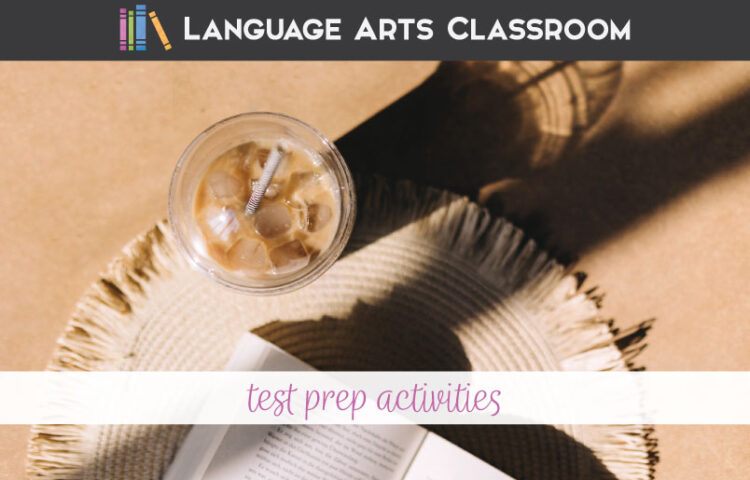Teaching test prep with high school students—specifically English test prep ideas.
I teach ACT prep classes through a community college. I travel to a variety of schools and meet new students almost every class. At the start of each class, I ask what they do to prepare, in and out of school. Answers vary. Test prep is different everywhere, every school district, every home. Even with these differences, some ideas can be implemented with most high school students.
As students gear up for college entrance exams like the ACT, teachers may begin test prep units. Even if you implement test prep throughout the year, schools often ask teachers for an extra emphasis during the second semester. Parents hire tutors to help their children raise a test score for a particular college or scholarship.
If you are gearing up for test prep or need an injection of newness with your ideas, I have six ideas that help me—specifically for English test prep. No matter the subject matter, you should be able to use some of these ideas.
Here are six tips to help you as you are teaching test prep with high school students.
1. Acknowledge the negative.
These are older kids; they get it. No one enjoys taking a test. (Well, I don’t know anyone.) The test is long. The test is boring. Very few students enjoy all the subjects covered on the test. Personally, as an adult and as an educator, I don’t think standardized tests accurately reflect what a person knows and what that person is capable of doing.
Acknowledging that this isn’t fun, that students would rather be in bed during the test, can set the mood for studying. Students know you are honest and they know you are on their side. Before I review with students, I am honest with them.
High schoolers can get upset about whatever standardized test they are facing. With good cause, too! Politicians debate tests, money from scholarships can affect the rest of their lives, and everyone talks about this big test.
Yes, the upcoming test is important and students should prepare themselves. Still. When I see shaking and crying teens, I want to cry with them. A bit of adult “big picture” talk can help:
The test is a few hours of your life. The test is not who you are. The test doesn’t show everything you know or how you’ve grown.
I tell them those concepts sincerely. They are true. The test is not everything. Students should approach the test in a serious manner, but if they don’t earn the score they wanted that doesn’t mean they failed. The test is a small component of their educational life.
2. Use a variety of activities.
Big, thick books exist that will walk students through test prep practice. Those are very thorough and very helpful. I know students who read those books and complete the majority of the practice tests. Especially for English test prep review, the material can be dry.
You probably do not have enough books for every student and even if every student has such a book, the practice tests can become laborious. I know that I use more than one tool when I personally study for a test.
If I have a class that will eventually review for a standardized test, I review throughout the year rather than simply a few days before the test. For instance, I will incorporate task cards as bell ringers so that students can review a little each day. Plus with task cards, students can work in stations or with a scoot activity—I’m not committed to using the task cards only as bell ringers.

3. Provide introspection.
Sometimes youth thought process works like this:
I don’t like it + I don’t understand the consequences = I won’t do it.
Unfortunately, parents and teachers emphasize the ACT (or whatever standardized test) because it will affect students’ futures concerning college choices and money. Introspection can help students see this too.
Share with them a project that isn’t beloved, that you had to mentally talk yourself to do. For instance, I disliked prepping for my master’s research presentation. Am I glad that I have a master’s degree now? Yes. Am I glad that I prepared and the presentation of my research went well? Of course. Did I enjoy the presentation? Not really. I didn’t enjoy the preparation either.
So, I try to relate to students. I explain that this thing that sits in front of them will be over. Life has yucky components we don’t necessarily find joy in. Hopefully we get a result that will make life better.

4. Review slowly.
I model how to review for larger tests in life. Students will probably take final exams in college, state licensing exams, and other certification tests. Instead of cramming the night before a test, students should review slowly over time.
For instance, when we write and target problem areas, I mention that this sort of material is on standardized tests because colleges expect students to understand these concepts for college. Grammar errors can sneak into writing and muddy messages. Standardized tests cover those types of errors because students should understand how to effectively write.
When we review naturally within our assignments, I simply remind students that they are actually reviewing for an upcoming test. English test prep review, especially, honestly exists in many components of an ELA course.
5. Share your pride.
They are studying and putting forth effort! This fact has meaning and acknowledging it goes a long way with students.
Because I travel from school to school, I probably will not see the students I saw last night again. Leaving, my message to them is always the same:
Try your hardest, and I will be proud of you. I will be thinking of you on the day of the test.
This isn’t a lie either. Standardized test dates? I mark them down. I’m thinking of my students, sending them good vibes. I am proud that they attended a class and practiced the test with me, listened to rules and strategies.
6. Be clear with expectations.
Eventually, teachers must prepare students. I spend time before the test prep begins building relationships and trust about test prep because it pays off once we begin studying.
I work through expectations and guidelines concerning each portion of the test. Sometimes, students know this information and have learned it before. They simply need reminded. Other times, the formatting of the test bothers students. Give them sample problems and explain what the question asks, such as subject-verb agreement or pronoun-antecedent agreement. Model your thought process as you work through the questions.
Students probably will be nervous the day of the test. Remind them that they now understand the directions!
When students need more intense practice, worksheets should probably not be your only method of review. Use stations to help with scaffolding. You can also divide portions of a review book and jigsaw pieces.
Teaching test prep with high school students is a balance. Adults know that tests like the ACT are important, and we know the results aren’t everything. We want students to do their best, but we don’t want them ill over a test. Acknowledging the negative, showing students you are on their side, and supporting them in other ways can go a long way as you are teaching test prep with high school students.
These tips convey honesty and support while hopefully balancing the importance of a big test with the needs of the person taking the test. Standardizing testing has huge implications today, and teachers can help students through the process. What tips would you add for helping students facing a standardized test?
Note: I am not associated with the ACT or any standardized test.
Need English test prep materials? My library has FREE task cards for studying the English/language portion of a standardized test. Test prep with high school students can be engaging, so download that material for free.






